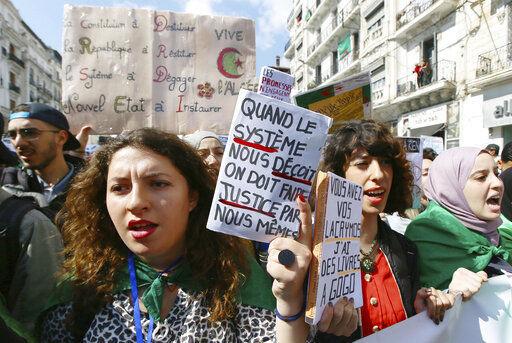omaha.com
Algerian students march during a protest in Algiers, Algeria, Tuesday, April 2, 2019. Algerian protesters and political leaders are expressing concerns that ailing President Abdelaziz Bouteflika’s departure will leave the country’s secretive, distrusted power structure in place. Placard, center, reads, “when the system fails we have to make justice by ourselves.” THE ASSOCIATED PRESS
The following editorial appeared in the Washington Post.
The Arab Spring appeared to wither away years ago amid coups, civil wars and authoritarian restorations.
But the powerful currents that created it — popular unrest with economic stagnation and corruption, and yearning for more open societies — never disappeared.
Algeria was largely untouched by the uprisings that in 2011 led to the downfall of dictators in neighboring Tunisia and Libya, as well as Egypt.
But when Bouteflika, who has been in power since 1999, put himself forward for a fifth presidential term, tens of thousands of people took to the streets in February, making Algiers look a lot like Cairo eight years ago.
Six subsequent weeks of largely leaderless demonstrations have been dominated by young people, who could not abide the prospect of further rule — at least in name — by an 82-year-old man who has not spoken in public since he suffered a stroke six years ago.
Algeria’s largely opaque ruling clique, dominated by the military, hasn’t yet yielded to the demands of the protesters for an end to the current political system and a transition to genuine democracy.
Led by the army chief of staff, Ahmed Gaid Salah, it is trying to preserve itself by casting off its most despised elements.
It’s too early to tell how much further change will go.
The constitution calls for new elections within 90 days, but if the political system is not reformed, the protests appear likely to continue.
President Donald Trump has bet on the region’s latest generation of dictators, including Saudi Arabia’s Mohammed bin Salman and Egypt’s Abdel-Fattah el-Sissi, even as they have pursued the most brutal repression in their nations’ modern histories.
Yet Egypt and Saudi Arabia are not looking stable: The regimes have failed to offer workable economic solutions, especially for the swelling youth population.
An adjustment of U.S. policy is badly needed. Trump, who has invited el-Sissi to visit the White House next week, ought to press the Egyptian ruler to stop suppressing civil society and jailing peaceful opponents — especially secular liberals who advocate peaceful reforms.
Above all, el-Sissi should be pressed to drop his misguided attempt to change the constitution so that he can serve until 2034 — effectively, it would allow him to remain in leadership for life.
Algeria offers another vivid example of what can happen when unaccountable rulers entrench themselves while ignoring their societies’ pressing need for change.








